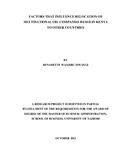| dc.description.abstract | With advent of economic globalization, internationalization has become one of the most
important strategies for firms to achieve sustainable growth. Motivations for
internationalization of firms have drawn great interests from practitioners and
researchers. Well-established multinational companies are suddenly finding themselves
closing shop from some regions and countries and relocating to other regions.
Multinationals which have closed their operations in Kenya include Colgate Palmolive,
Johnson & Johnson, Agip, Unilever, Procter & Gamble, and recently, ExxonMobil,
Caltex and Shell just to mention a few. The purpose of the study was to determine the
factors that lead to relocation of multinational oil distributors from Kenya. This study had
a specific emphasis on the factors that have led Shell Kenya to divest.A descriptive case study design was employed in this study. The target subjects for this
study were senior employees at Kenya Shell. Interview method was applied to collect
data from four senior employees at Shell who include General Manager – Kenya,
Assistant General Manager – Kenya, Head of Marketing and Fuel Business Development
– Kenya and Head of Operations and Projects Development – Kenya. Data collected was
qualitative in nature which was analyzed through content analysis.
Study findings indicate that Shell Kenya was divested due to various contributing factors
the most compelling being shrinking profit margins due to price ceilings set by the energy
regulatory commission. Results also indicated that the country’s poor and stagnant
petroleum infrastructure was another major contributing factor. Competition from small
and medium upcoming oil companies in Kenya and the multinationals already in the
country is another factor contributing to the unattractiveness of the Kenyan market.
Government interference in the oil import, distribution and pricing was another factor
that made Shell Kenya to close its operations
The following recommendations are made. First, the pricing formula should be managed
by an independent and credible firm which should ensure that all factors are put in the
pricing formula not to strangulate margins of oil companies too thin. Second, it’s
important to lessen political and government input in oil import, distribution and pricing.
Third, multinationals should ensure that they have sound and competitive marketing and
customer service strategies to be able to compete with the upcoming small and medium
oil distribution companies. Lastly, oil companies should strengthen their upstream
operations not just focusing all their resources and competencies on the downstream
operations. | en |

